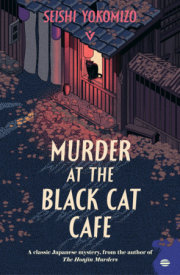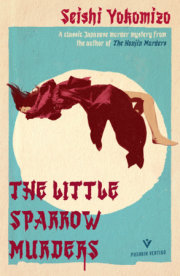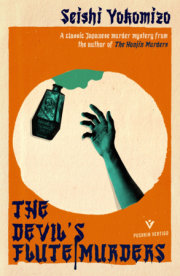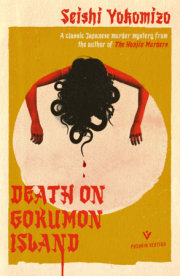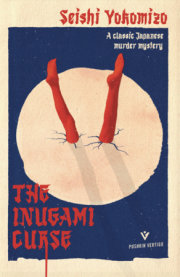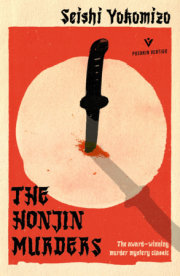“I just don’t know what to do. I mean, she’s out of her mind. Completely insane. Yes, she’s always been a little unpredict- able, but this goes way beyond mere whimsy—and it scares me. Listen, Torata, whatever you might think, deep down I’m a level-headed person. Your average, common-sense sort of man. Sure, I might play the bad guy sometimes, talk or act a little rough, but chalk that up to vanity—an attempt to camouflage my timid nature, so no one sees me for who I really am. You know how, with fish and insects and things, it’s always the weakest species who go out of their way to look intimidating? Well, it’s the same with me. I’m serious! However tough I might act, however bold my bluster, at heart I’m the conscientious type. Remember when you told me I loved playing the villain? Well, you were right. It’s a sort of hobby of mine, not my true nature. Which is why, however reckless I might appear, I always know where to draw the line. Whenever I’m about to blunder over one of society’s moral boundaries, I’ve got the sense to draw back. Whereas this woman… well, she really doesn’t. The very concept of morality means nothing to her. Hopeless, it is… Hey, say something, would you?”
“How can I, when I’ve no idea what you’re talking about?” “Really? No idea at all? I’ve been chewing your ear off all this time and you still haven’t figured it out? Where’s that
sharp intuition you’re always boasting about?”
At this I had to chuckle. Then, lighting a hand-rolled ciga- rette, I took a long drag and studied the drink-ravaged face of Naoki Sengoku. Normally, in situations like this, the calmer and more composed I acted, the more flustered and impatient my companion would become—and yet this time, Naoki was simply sitting there, waiting for me to say something. Well, well: it looked like he really
was serious…
“Listen,” I replied eventually, “however perceptive I might be—and I’m not claiming I
am, you understand—no matter how sharp my intuition, what could I possibly infer from your rambling? There’s no more foolish pastime than hunting for meaning in the ravings of a drunk.”
“Me, a
drunk?” He laughed. “Actually, maybe you have a point. Look how quickly I’m getting through this stuff.”
Naoki sloshed some more of the Suntory whisky he’d brought with him into his glass, then knocked it back. His hands were already shaking so much from the drink that roughly half of it spilled onto the desk. It was wasteful, really—not least because the whisky had been a gift for me, even if he’d ended up drinking nearly all of it himself. In any case, it was clear that he was unusually rattled about something.
“But you’ve got the
gist, haven’t you?” he went on. “The basic thrust?”
“Can’t say it’s beyond me, no. You’re talking about Yachiyo, aren’t you?”
Naoki fixed his bleary eyes on me. They were streaked with a mesh-like pattern of red veins, to which the whisky had added a quartz-like shimmer.
Yet beneath that sheen I sensed an unsettling, feverish inten- sity. It struck me that perhaps he wasn’t really drunk at all. All of a sudden, I felt oddly wary of him. Naoki must have noticed the shift in my mood, because he abruptly averted his gaze.
“That’s right,” he muttered, pouring himself another whisky. “It’s about Yachiyo. She’s planning on getting married.”
“I see. How old did you say she was?”
“Twenty-three. Wait, no, twenty-four this year.”
“That’s a perfectly normal age to get married. In fact, wouldn’t it be odd if she
weren’t considering it?”
“Oh, sure. You’re not wrong. The thing is, it all depends on the man, wouldn’t you say?”
“In other words, you disapprove of her choice of fiancé.” Naoki nodded grimly.
“Well, what’s he like? Actually, spare me the details. It’s none of my business.”
“But that’s precisely why I dropped by—to tell you about all this. So do me a favour and listen, would you? I mean, I plan on telling you whether you like it or not.”
“Look, Naoki. I don’t know the first thing about this Yachiyo. Yes, you’re always mentioning her, but I’ve never met the woman. Never even laid eyes on her, in fact. I know you showed me a photo once, and I’ll admit she was quite beautiful, but other than that she’s a complete enigma to me. So why are you so keen to discuss her marriage prospects with me?”
“Why—because I trust you, of course!” “Oh, come off it.”
“I’m serious, Torata. I’ve been dying to ask someone what they make of all this, but the problem is I don’t have much faith in my fellow humans. With the exception, that is, of Torata Yashiro. That’s right. I trust you. And you know it, don’t you? See, when I tell
you something, I can rest safe in the knowledge that you won’t go blabbing about it to anyone else without my permission.”
“Well, isn’t that something… Naoki, I’m happy to have earned your trust, I really am—but does that mean you’re asking me to keep a secret?”
“Absolutely. I should make that clear at the outset.” “Then count me out. I don’t mind losing your trust if it
means avoiding the ordeal of listening to whatever it is you’re about to tell me.”
Naoki chuckled. “Nice try. Anyway, you can protest all you like, but on the inside I know you’re mighty curious. Yes, there’s no use pretending. Oh, and there’s another reason for me telling you all this—but that can wait. For now, my dear Torata, it’s time for you to listen up.”
Naoki had an obsessive streak that was only reinforced by his excitable personality. Once he got an idea into his head, it would absorb him completely. At times like that, he became truly overbearing, ploughing ahead without a thought for other people’s feelings. Being the timid sort, I tended to go along with him. Then, later, I’d regret doing so and grow bitter about the whole incident—only to end up repeating the whole process the next time he fell into one of these domineering moods.
Now, too, he paid no attention whatsoever to the obvious irritation on my face as he launched into his tirade.
“It’s about this fiancé…” he began, before suddenly paus- ing, as if he’d changed his mind. “Actually, before we get to that, let me ask you this. Are you familiar with the incident that took place at Cabaret Hana last year? You know—that hunchbacked artist who got himself shot.”
I glanced at Naoki in surprise—and not just because of the unexpected direction in which our conversation had lurched. The incident in question had been so bizarre that even now, some six months after it had occurred, the memory of it con- tinued to haunt a certain corner of my brain.
Allow me to explain.
Hana was one of the countless cabarets that sprouted up, like so many mushrooms after the rain, following the end of the war. It was located on a Ginza backstreet. Struggling novelist that I am, I’ve never possessed the financial means to find out what goes on in such places, but Naoki had informed me that this particular venue was even more luxurious than most of its kind. “See, cabarets come in all shapes and sizes,” he’d once told me. “A lot of them are the sort of shabby dives that used to call themselves ‘cafés’, and worse besides—but Hana is in a league of its own. It’s in a prime spot, tucked just off the main Owaricho drag on the ground floor of a bombed-out building that was repurposed after the war. The owner only got away with it because they were so quick off the mark—these days, with all the new planning restrictions, there’s no way you could pull off something like that. It’s cavernous, and the decor is first-class. You’d hardly think you were in a country that just lost a war. Though maybe it was that sort of attitude that cost us the war in the first place…” He chuckled. “Anyway, never mind that. You know I’m not one for moralizing or brooding on things. What I’m saying is, it has to be one of the best spots in Tokyo. The band is fantastic, for starters, as are the stage performers. The flip side is that it’s expensive—one of the biggest rip-offs in town, in fact. Maybe that’s for the best. The only people who can afford to frequent a place like that are black-market dealers and brokers. It’s certainly no place for a gentleman like you.”
Naoki, on the other hand, seemed to be one of the club’s regulars.
Now, one day last October—the third, I later confirmed after digging out a newspaper from the period—a certain woman arrived at this cabaret. She appeared to be around twenty years old and was, by unanimous agreement of all those present, rather beautiful. Her outfit was also remarkable: the sort of get-up that only someone from the upper echelons of the post-war nouveau riche could afford—or so the other women present at the cabaret, brimming with envy, were reported to have concluded.
This was where things became puzzling. The woman had captured the attention of everyone at the cabaret—and yet later, when she became the topic of a news story, not a single person was able to provide a conclusive description of her clothing. Some claimed she wore a black fur coat, while others insisted the garment in question had been a dazzling pink. This confusion extended to each item of her outfit, with con- tradiction at every turn.
It wasn’t just her clothing, either. While it was generally agreed that she had exceptionally beautiful features, the precise nature of that beauty was the subject of further disa- greement. Some claimed she had one of those full-cheeked faces that are so popular these days, while others asserted that she had the oval-shaped visage associated with more classi- cally Japanese notions of beauty. Opinions were also divided when it came to her make-up: one witness might describe it as garish and overdone, while another would swear it was the epitome of subtle refinement. In the end, these varied testimonies only served to confirm the utter unreliability of human observation. Not one of them offered a concrete clue as to the woman’s identity.
What’s more, the woman had been accompanied by three young men, all of whom were questioned rigorously by the police after the incident—and yet these accounts, too, turned out to be frustratingly ambiguous. Granted, they were students, and quite drunk at the time, so perhaps it isn’t surprising that they lacked the inclination, or clarity of mind, to pay much heed to specific details of the woman’s clothing or make-up.
Their testimony was as follows.
“We were at a bar called Tulip on a Ginza backstreet when she walked in. She was drinking alone at first, but before long, without any of us inviting her over, she’d joined us. What’s that? Oh, you bet she can handle her drink. Kept knocking back whiskies like they were water. Soon enough we were all pretty merry, and that was when she announced that she wanted us to take her somewhere a bit more lively. So we decided we’d head to Hana, and all piled out of the bar. That’s right, she paid. No, not just the bill we’d run up since she joined us—our entire tab for the night. It was like she had a bottomless purse.”
At this point, the officer questioning them was determined to get something straight. Who had suggested going to Hana: the students, or the woman? On this point, the students were unanimous.
“We did. She mentioned the idea of heading somewhere more lively, but we were the ones who suggested Hana. She didn’t seem to have heard of it before—in fact, she didn’t even know what it was. When we explained it was a cabaret, she said she’d been to dance halls before, but never a cabaret, and asked us to take her. So no, I really don’t think she was planning on going to Hana from the outset.”
It was around eight o’clock when the four arrived at the cabaret. The woman, already quite tipsy, went on quaffing her drinks, so that by the time the incident occurred she appeared to be thoroughly inebriated.
Eventually, Koichi Hachiya, the hunchbacked artist, made his arrival. The two friends who were with him that even- ing both asserted that he, too, had been drinking heavily, though not so much as to lose his restraint. Other than his physical deformity, there was little about his appearance that might instil particular aversion in others. In fact, despite his hunchback, Hachiya was rather handsome. He also dressed well, usually favouring a crisp white shirt and black tie. His trousers were always neatly creased, and his shoes gleamed with polish. In short, not only was he quite wealthy, he also possessed a refined sense of style.
However, the moment Hachiya and his two friends walked through the cabaret’s entrance, merrily laughing and chat- ting away, the woman’s expression changed—or so the three students later claimed to remember. At any rate, the mere sight of him seemed to give her an enormous shock. Her eyes widened as if she had suddenly sobered up, and her lips began quivering uncontrollably. She got abruptly to her feet and, swaying slightly, tottered over towards him.
“You!” she shouted. “So, you’re finally here. You
monster!” An instant later, she fired a gun from within her handbag, and Hachiya crumpled weakly to the cabaret floor.
Copyright © 2026 by Seishi Yokomizo. All rights reserved. No part of this excerpt may be reproduced or reprinted without permission in writing from the publisher.



